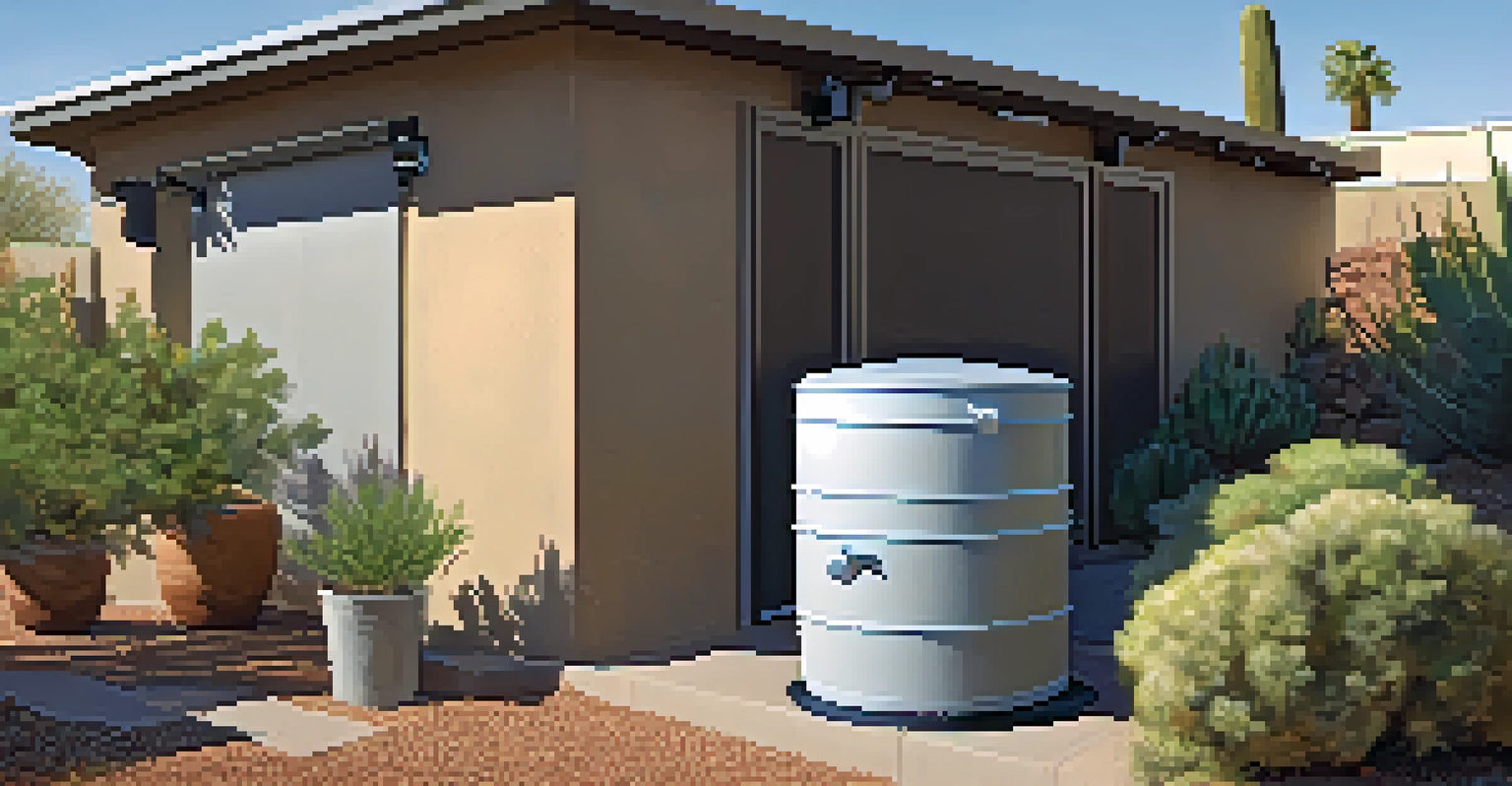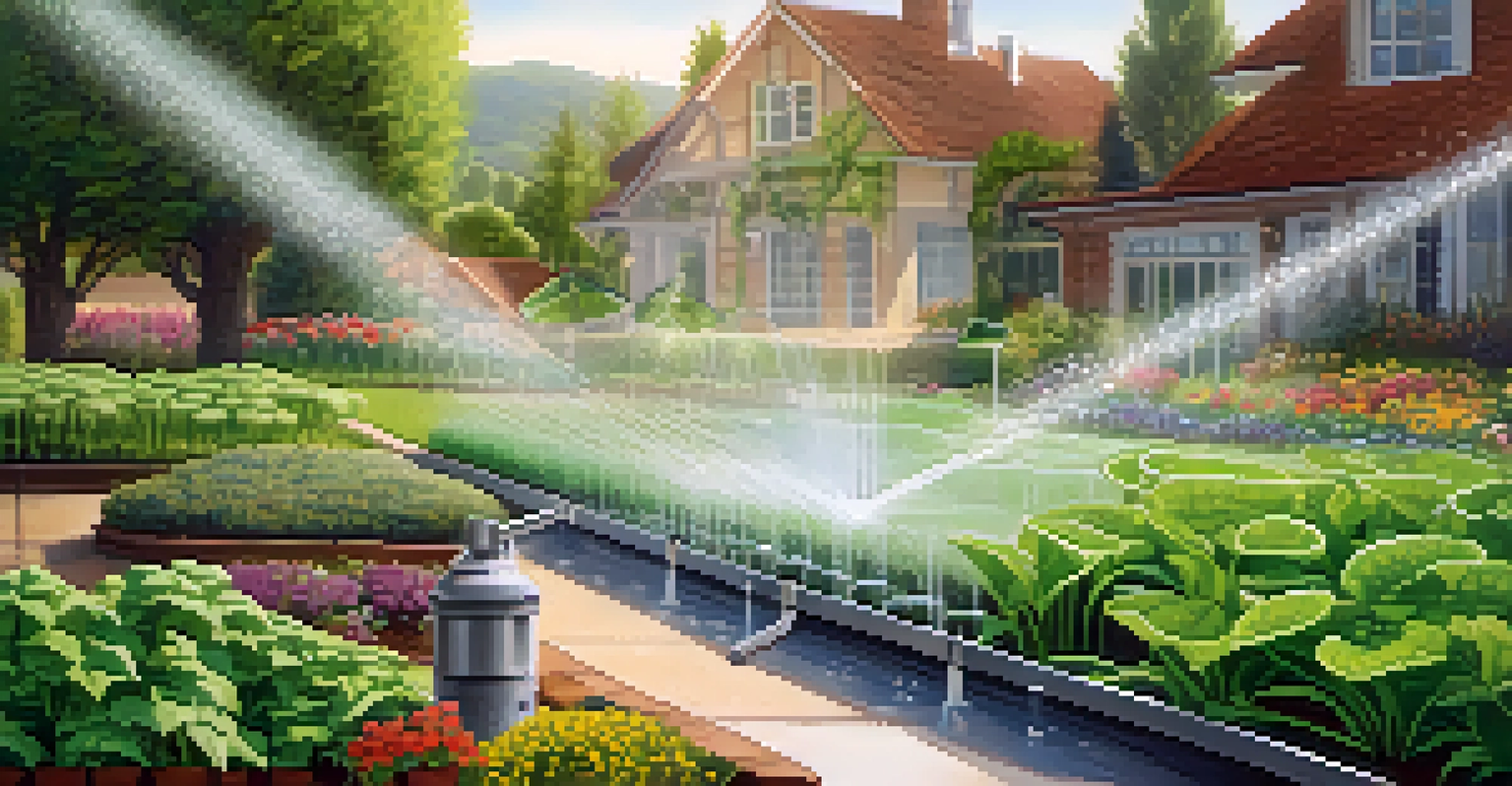Innovative Water Management Practices for Arid Phoenix Regions

Understanding the Water Challenges in Phoenix's Arid Climate
Phoenix, known for its sun-soaked deserts, faces significant water challenges due to its arid climate. The city relies heavily on a limited supply from the Colorado River and groundwater sources, which are diminishing. As the population grows, these resources are under increasing pressure, leading to a critical need for innovative solutions.
Water is the driving force of all nature.
This aridity not only affects drinking water availability but also impacts agriculture, landscaping, and local ecosystems. With temperatures soaring during summer, the demand for water only intensifies, making it essential to explore sustainable practices. Understanding these challenges is the first step toward effective water management.
Moreover, climate change exacerbates these issues, creating a scenario where traditional water sourcing methods may no longer suffice. By grasping the unique water challenges faced by the Phoenix region, we can begin to look at innovative practices that can help secure a sustainable future.
Rainwater Harvesting: A Simple Yet Effective Solution
One of the most straightforward yet impactful practices for arid regions like Phoenix is rainwater harvesting. This method involves collecting and storing rainwater from roofs and other surfaces during the rare rain events. By capturing this precious resource, households can significantly reduce their reliance on municipal water supply.

Implementing rainwater harvesting systems can be as simple as installing barrels or more complex with cisterns that can store larger amounts of water. Not only does this practice provide a supplemental water source for irrigation and landscaping, but it also helps manage stormwater runoff. This reduction in runoff can prevent flooding and erosion, showcasing the multifaceted benefits of rainwater harvesting.
Innovative Water Solutions Needed
Phoenix faces significant water challenges due to its arid climate, requiring innovative practices for sustainable management.
Moreover, community awareness and educational programs play a crucial role in encouraging residents to adopt these systems. By making rainwater harvesting a part of everyday life, Phoenix can create a culture of sustainability that benefits both the environment and the community.
Graywater Recycling: Turning Wastewater into a Resource
Graywater recycling is another innovative practice gaining traction in arid regions like Phoenix. This process involves reusing water from baths, sinks, and washing machines for irrigation and other non-potable uses. With proper treatment and filtration, graywater can be a sustainable alternative to fresh water, helping conserve precious resources.
The future will either be green or not at all.
Installing graywater systems in homes can be an effective way to reduce water consumption significantly. For instance, using this recycled water for landscaping or gardens not only provides hydration to plants but also lessens the burden on municipal water supply. This practice not only promotes sustainability but also lowers water bills, making it a win-win for homeowners.
However, community guidelines and regulations are essential to ensure safe graywater use. By educating residents about the benefits and safety measures of graywater recycling, Phoenix can foster a culture of resourcefulness that addresses its water scarcity challenges.
Xeriscaping: Landscaping for Low Water Use
Xeriscaping is a landscaping philosophy designed specifically for arid climates and is particularly beneficial in Phoenix. This approach emphasizes the use of drought-resistant plants and efficient irrigation techniques, allowing homeowners to create beautiful landscapes without excessive water use. By opting for native plants, residents can cultivate gardens that thrive in the local climate.
In addition to conserving water, xeriscaping reduces maintenance costs and labor, as these plants are often more resilient to pests and diseases. For example, incorporating succulents and cacti not only adds visual interest but also minimizes the need for regular watering. This shift in landscaping practices promotes a more sustainable and eco-friendly approach to gardening in the desert.
Community Engagement is Key
Engaging the community through education and outreach is essential for promoting sustainable water management practices in Phoenix.
Furthermore, xeriscaping can enhance property values and contribute to the overall aesthetic of neighborhoods. As more residents adopt these practices, Phoenix can transform into a city that embraces its natural desert beauty while prioritizing water conservation.
Smart Irrigation Systems: Technology at Work
The advent of smart irrigation systems brings a technological edge to water management in arid areas. These systems utilize sensors, weather data, and soil moisture levels to optimize watering schedules and amounts, ensuring plants receive just the right amount of water. This precision helps prevent overwatering, which is a common issue in traditional irrigation methods.
For instance, smart irrigation controllers can automatically adjust watering based on rainfall or evaporation rates, conserving water while maintaining healthy landscapes. Homeowners can manage their systems remotely via smartphones, providing convenience and control over their water use. This integration of technology not only promotes efficiency but also fosters a proactive approach to water conservation.
As awareness of smart irrigation systems grows, more homeowners and businesses in Phoenix are investing in these solutions. By embracing technology, the community can take significant strides toward sustainable water management while enjoying lush and vibrant outdoor spaces.
Community Engagement: Building a Water-Conscious Culture
Engaging the community is crucial for the success of innovative water management practices in Phoenix. Education and outreach programs can empower residents to adopt sustainable practices like rainwater harvesting, graywater recycling, and xeriscaping. By fostering a sense of community responsibility, individuals can contribute to a collective effort to conserve water.
Local organizations and government initiatives play a vital role in promoting awareness and providing resources for residents to implement these practices. Workshops, demonstrations, and informational campaigns can help demystify the concepts and encourage participation. When residents see their neighbors engaging in sustainable practices, it creates a ripple effect that can lead to widespread adoption.
Supportive Policies Drive Change
For innovative water management practices to thrive, supportive policies and incentives from policymakers are crucial.
Moreover, community involvement can lead to the development of policies and programs that support water conservation efforts. By working together, the people of Phoenix can create a water-conscious culture that prioritizes sustainability and resilience in the face of water scarcity.
Policy Changes: Supporting Innovative Water Management
For innovative water management practices to thrive in Phoenix, supportive policies are essential. Policymakers must recognize the importance of sustainable water management and create frameworks that encourage the adoption of practices like rainwater harvesting and graywater recycling. This often means providing incentives, such as rebates or tax credits, to residents who implement these systems.
Additionally, regulations and guidelines must be updated to facilitate the safe use of graywater and rainwater. Streamlined permitting processes can make it easier for homeowners to install these systems, breaking down barriers to adoption. When the government actively supports sustainable practices, it sends a powerful message to the community about the importance of water conservation.

Furthermore, collaboration between government agencies, community organizations, and residents can drive policy changes that reflect the needs of the community. By prioritizing innovative water management in policy discussions, Phoenix can pave the way for a more sustainable future, ensuring water availability for generations to come.
The Future of Water Management in Phoenix
The future of water management in Phoenix hinges on the successful implementation of innovative practices tailored to its unique arid climate. As the city continues to grow, a proactive approach to water conservation will be crucial. By adopting solutions like rainwater harvesting, graywater recycling, and smart irrigation, residents can play an active role in securing their water future.
Moreover, the collaboration between the community, policymakers, and local organizations will be vital in driving these initiatives forward. It’s not just about individual efforts; it’s about creating a culture of sustainability that permeates the entire city. By working together, Phoenix can develop a robust water management strategy that addresses both current and future challenges.
Water Scarcity in Phoenix
Phoenix faces significant water challenges due to its arid climate and growing population, necessitating innovative solutions.
Ultimately, embracing innovation and community engagement will shape the narrative of water management in Phoenix. With a collective commitment to sustainability, the city can transform its water landscape, ensuring resilience and abundance in the face of aridity.